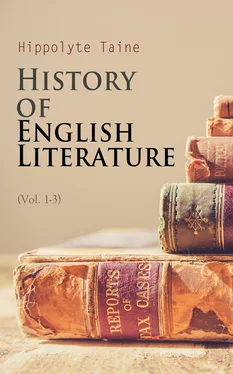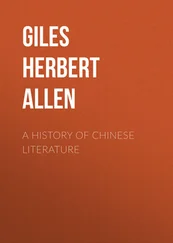To make away his duchess and her husband." [480]
So, her husband, Camillo, is strangled, the Duchess poisoned, and Vittoria, accused of the two crimes, is brought before the tribunal. Step by step, like a soldier brought to bay with his back against a wall, she defends herself, refuting and defying advocates and judges, incapable of blenching or quailing, clear in mind, ready in word, amid insults and proofs, even menaced with death on the scaffold. The advocate begins to speak in Latin.
" Vittoria. Pray my lord, let him speak his usual tongue; I'll make no answer else. Francisco de Medicis. Why, you understand Latin. V. I do, sir; but amongst this auditory Which come to hear my cause, the half or more May be ignorant in't."
She wants a duel, bare-breasted, in open day, and challenges the advocate:
"I am at the mark, sir: I'll give aim to you,
And tell you how near you shoot."
She mocks his legal phraseology, insults him, with biting irony:
"Surely, my lords, this lawyer here hath swallow'd
Some pothecaries' bills, or proclamations;
And now the hard and undigestible words
Come up, like stones we use give hawks for physic:
Why, this is Welsh to Latin."
Then, to the strongest adjuration of the judges:
"To the point,
Find me but guilty, sever head from body,
We'll part good friends; I scorn to hold my life
At yours, or any man's entreaty, sir....
These are but feigned shadows of my evils:
Terrify babes, my lord, with painted devils;
I am past such needless palsy. For your names
Of whore and murderess, they proceed from you,
As if a man should spit against the wind;
The filth returns in's face." [481]
Argument for argument: she has a parry for every blow: a parry and a thrust:
"But take you your course: it seems you have beggar'd me first,
And now would fain undo me. I have houses.
Jewels, and a poor remnant of crusadoes:
Would those would make you charitable!"
Then, in a harsher voice:
"In faith, my lord, you might go pistol flies;
The sport would be more noble."
They condemn her to be shut up in a house of convertites:
" V. A house of convertites! What's that? Monticelso. A house of penitent whores. V. Do the noblemen in Rome Erect it for their wives, that I am sent To lodge there?" [482]
The sarcasm comes home like a sword-thrust; then another behind it; then cries and curses. She will not bend, she will not weep. She goes off erect, bitter and more haughty than ever:
"I will not weep;
No, I do scorn to call up one poor tear
To fawn on your injustice: bear me hence
Unto this house of what's your mitigating title?
Mont. Of convertites. V. It shall not be a house of convertites; My mind shall make it honester to me Than the Pope's palace, and more peaceable Than thy soul, though thou art a cardinal." [483]
Against her furious lover, who accuses her of unfaithfulness, she is as strong as against her judges; she copes with him, casts in his teeth the death of his duchess, forces him to beg pardon, to marry her; she will play the comedy to the end, at the pistol's mouth, with the shamelessness and courage of a courtesan and an empress; [484]snared at last, she will be just as brave and more insulting when the dagger's point threatens her:
"Yes, I shall welcome death
As princes do some great ambassadors;
I'll meet thy weapon half way.... 'Twas a manly blow;
The next thou giv'st, murder some sucking infant;
And then thou wilt be famous." [485]
When a woman unsexes herself, her actions transcend man's, and there is nothing which she will not suffer or dare.
SECTION VII.—Female Characters
Table of Contents
Opposed to this band of tragic characters, with their distorted features, brazen fronts, combative attitudes, is a troop of sweet and timid figures, pre-eminently tender-hearted, the most graceful and loveworthy whom it has been given to man to depict. In Shakespeare you will meet them in Miranda, Juliet, Desdemona, Virgilia, Ophelia, Cordelia, Imogen; but they abound also in the others; and it is a characteristic of the race to have furnished them, as it is of the drama to have represented them. By a singular coincidence, the women are more of women, the men more of men, here than elsewhere. The two natures go each to its extreme: in the one to boldness, the spirit of enterprise and resistance, the warlike, imperious, and unpolished character; in the other to sweetness, devotion, patience, inextinguishable affection [486]—a thing unknown in distant lands, in France especially so: a woman in England gives herself without drawing back, and places her glory and duty in obedience, forgiveness, adoration, wishing and professing only to be melted and absorbed daily deeper and deeper in him whom she has freely and forever chosen. [487]It is this, an old German instinct, which these great painters of instinct diffuse here, one and all: Penthea, Dorothea, in Ford and Greene; Isabella and the Duchess of Malfi, in Webster; Bianca, Ordella, Arethusa, Juliana, Euphrasia, Amoret, and others, in Beaumont and Fletcher: there are a score of them who, under the severest tests and the strongest temptations, display this wonderful power of self-abandonment and devotion. [488]The soul, in this race, is at once primitive and serious. Women keep their purity longer than elsewhere. They lose respect less quickly; weigh worth and characters less suddenly: they are less apt to think evil, and to take the measure of their husbands. To this day, a great lady, accustomed to company, blushes in the presence of an unknown man, and feels bashful like a little girl: the blue eyes are dropped, and a child-like shame flies to her rosy cheeks. Englishwomen have not the smartness, the boldness of ideas, the assurance of bearing, the precocity, which with the French make of a young girl, in six months, a woman of intrigue and the queen of a drawing-room. [489]Domestic life and obedience are more easy to them. More pliant and more sedentary, they are at the same time more concentrated and introspective, more disposed to follow the noble dream called duty, which is hardly generated in mankind but by silence of the senses. They are not tempted by the voluptuous sweetness which in southern countries is breathed out in the climate, in the sky, in the general spectacle of things; which dissolves every obstacle, which causes privation to be looked upon as a snare and virtue as a theory. They can rest content with dull sensations, dispense with excitement, endure weariness; and in this monotony of a regulated existence, fall back upon themselves, obey a pure idea, employ all the strength of their hearts in maintaining their moral dignity. Thus supported by innocence and conscience, they introduce into love a profound and upright sentiment, abjure coquetry, vanity, and flirtation: they do not lie nor simper. When they love, they are not tasting a forbidden fruit, but are binding themselves for their whole life. Thus understood, love becomes almost a holy thing; the spectator no longer wishes to be spiteful or to jest; women do not think of their own happiness, but of that of the loved ones; they aim not at pleasure, but at devotion. Euphrasia, relating her history to Philaster, says:
Читать дальше












